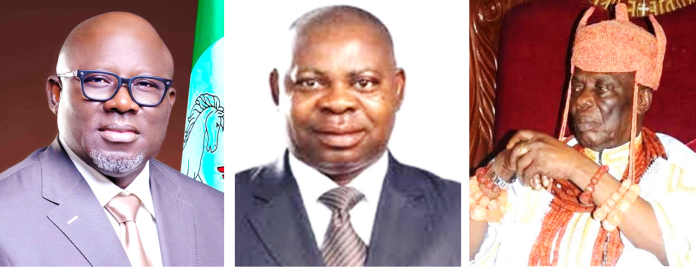BY CHIBUZOR ISICHEI
From time immemorial, communities have found ways of governing themselves to ensure that peace and order prevailed. In most cases, the leaders of these communities are chosen by the people themselves and backed by the government with the presentation of the Staff of Office, which puts an official seal and authority on the traditional governance.
Traditional institutions in Nigeria refer to the customary systems of governance, leadership and social organisations that predate modern State structures. The institutions are rooted in the cultural and historical contexts of the various ethnic groups in Nigeria.
The traditional institutions include traditional rulers, chieftaincy institutions, customary law and practices and many others, and these institutions singularly and collectively play significant roles principally in conflict resolution and community development.
As a result of these critical roles they play in society, they are mostly revered. They are instrumental in maintaining peace, promoting cultural heritage, supporting community and making other positive contributions in their various communities, without which good governance in the entire State may not be cohesive, smooth and peaceful.
It is possible that this could be one of the secrets of Governor Sheriff Oborevwori’s good governance, the peaceful atmosphere which has prevailed in Delta State for many years now. He has recognised and cherished the value and significant roles that traditional institutions play in governance.
Recently, Governor Oborevwori, ably represented by his deputy, Sir Monday Onyeme, opened up and emphasised the value of the traditional institutions in governance of the State, stating that his administration has a high value in traditional institutions and that the government will continue to provide the platform for their contributions in governance and security.
The government’s position was conveyed on the occasion of the official presentation of the Staff of Office to the traditional ruler of Ukwu-Oba Kingdom in Aniocha South Local Government Area, Delta State, HRM Obi Cletus Nkeakam Ochei. 1.
On the occasion, Governor Oborevwori recognised traditional rulers and institutions as custodians of the people and culture and the role they play as agents of unity and partners of grassroots development.
The Governor then urged the people of Ukwu-Oba to always rally round their traditional ruler, adding that the ruler can only succeed with the loyalty, respect, and cooperation of his people.
Speaking on the Delta State Government and the respect for traditional institutions, Chief Ifeoha at Ute, in Ika North East Local Government Area, praised the governor for the recognition of chiefs and traditional rulers by this administration, saying that is the secret of Governor Oborevwori’s administration.
He said that the Governor is finding it easy to get to the people because he is at home with the grassroots. He said that any government that flows with the people will always succeed, adding that Governor Oborevwori’s administration has recognised many chiefs and traditional institutions according to the law, and there is no way he cannot win any election.
Also speaking on the role of traditional institutions, Mr Kingsley Okoh in Asaba said one area that the traditional rulers can help is in security. He said that the traditional rulers can do more to check insecurity because they are on the ground, adding that the government should do more by using the people in the communities to fish out the bad eggs in society.
He said that the government is far from the people, and the traditional rulers and traditional institutions, being closer to the people, can easily get the bad eggs and with a good rapport with the government in power, they can hand them over to the law enforcement agents for onward action.
Okoh, however, noted that the traditional institutions face a lot of challenges, limited financial autonomy, politicisation, modernisation and urbanisation, explaining that some other institutions are very poor and thus cannot resist being corrupt. He said that politicians can easily win them over by offering them money, some of whom cannot resist.
He also said ‘’modernisation and urbanisation have changed the status of most of our traditional rulers and traditional institutions, and some of them have departed from the path of their forefathers and therefore are not as effective and efficient as their predecessors, describing them as ‘psychedelic traditional rulers or chiefs who cannot preserve their cultural heritage.
From all indications, it has become clear that traditional institutions have become part and parcel of governance, and any government that wants to succeed should go with the grassroots by way of collaboration and cooperate with the people. That appears to be the secret of modern governance.


